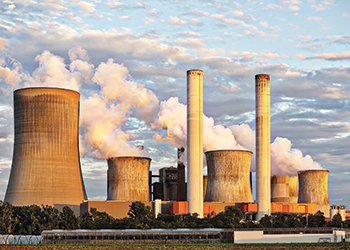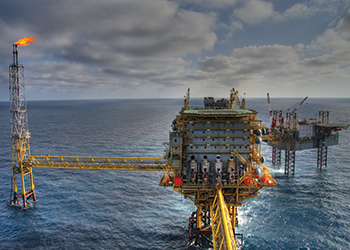
 Covid-19 is affecting energy use more than average
Covid-19 is affecting energy use more than average
Governments and industry need to make carbon valuable and seize the opportunity to invest in renewables so that low oil prices result in a lasting reduction of CO2 emission. If not, the current low oil prices will most likely delay critical climate action and result in higher CO2 emissions in long run, Arij van Berkel, Director of Research at Lux Research tells OGN
The Covid-19 crisis has had a tremendous impact on global economic activity with an estimated reduction in global GDP of nearly 5 per cent this year (IMF). The effect on CO2 emissions is estimated to be even larger.
CO2 emissions are expected to decrease 8 per cent this year, even as the global energy demand is expected to decline ‘only’ 6 per cent. The Covid-19 crisis is affecting fossil energy use more than average.
Working from home and a near complete stop of global travel has resulted in a reduction of oil demand by 30 per cent. Demand for electricity declined 20 per cent, and the corresponding reduction in production was achieved nearly exclusively by shutting down coal and gas fired power plants. It has left the oil and gas industry in uncharted territory.
Oil prices were already under pressure before the pandemic; now they have even been negative. The industry is facing a prolonged period of low oil prices as demand is set to recover only very gradually.
LOW PRICES AND CO2 EMISSIONS
There is a clear correlation between the expected return on capital (ROC) of the oil industry and the oil price. At the current oil price, the industry can expect less than 5 per cent ROC.
 |
Correlation between industry's ROC and average oil price |
Investments in renewable energy generation are, in fact, a better investment than oil at the moment. Oil and gas companies are increasing their efforts in renewable energy, while cutting expenses elsewhere. In this way, a prolonged period of low oil prices can indeed help to accelerate a global reduction of CO2 emissions.
The oil price is very inelastic and so it is unlikely that the low oil price will lead to a large structural increase in oil consumption. In that sense, there is no need to worry that a prolonged period of low oil prices will trigger an oil consumption and CO2 emission spree. That is not the whole story, however.
We performed research into the effect of CO2 pricing schemes on the economic viability of technology for mitigating CO2 emissions. The conclusion was that only very high prices (over $250 per tonne) would have a significant effect.
A much more effective way to prevent CO2 emissions is to increase the price of carbon instead of increasing the price of emitting carbon. The difference between the two is that most CO2 pricing schemes ignore carbon emissions from houses, cars and other distributed combustion.
If carbon itself is valuable, then all emission of CO2 is costly and there is a maximum incentive to switch to decarbonised energy sources or at least improve energy efficiency in all applications. It’s a basic economic truth: people are careful to not throw away valuables.
If carbon is valuable, it also provides a maximum incentive to recycle it. High oil and gas prices constitute the best economic climate technology to utilise CO2 as raw material for polymers, construction materials and chemicals.
Carbon is only valuable if oil prices are high. A prolonged period of low oil prices will slow down investments in carbon capture, storage and utilisation, it will reduce efforts to improve energy efficiency, and it will make decarbonised alternatives to oil such as electric vehicles comparatively more expensive.
GOVERNMENTS & INDUSTRY MUST ACT
The balance can tip either way. The question whether the current crisis will accelerate or delay the reduction of greenhouse gas emissions will be answered by industry and government together through their response to the crisis. Both government and industry have a unique opportunity to due the peculiar circumstances of this crisis.
The industry has been struggling to divert funds away from fossil energy to renewables because the return on fossil energy is still attractive for shareholders. In the current economic climate, that is no longer the case. Most companies are convinced they need to pivot away from oil eventually (that is around 2035). They now have unique opportunity to accelerate that pivot and be ready for a renewable energy future. Many companies are already actively seizing that opportunity.
And while high oil prices may result in making carbon valuable, they also lead to increased investments in oil exploration. This is why high oil prices have thus far not automatically resulted in a reduction in CO2 emissions.
If governments raise the price of carbon by imposing taxes on fuel as well as on industrial CO2 emissions, it also makes carbon valuable, without the effect of increasing the funds available for exploration of new wells. So far, governments have struggled to do so, afraid of a negative economic impact.
The current situation provides a unique opportunity to governments to act. With the current low consumption of oil and low prices, the economic impact of imposing a fuel tax is at an all-time low.
Moreover, cheap renewable energy can now be scaled rapidly. Wind and solar energy present affordable alternatives in many applications if high carbon prices threaten to make industrial production or travel too expensive, in most cases. Exceptions are shipping, aviation and some high temperature industrial processes.
If governments act to make carbon valuable and industry seizes the opportunity to invest in renewables, then the low oil prices will result in a lasting reduction of CO2 emission. If not, the current low oil prices will most likely delay critical climate action and result in higher CO2 emissions in long run.








































































